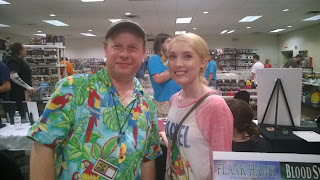10.
A run-on sentence is a really long sentence. Wrong! They
can actually be quite short. In a run-on sentence, independent clauses are
squished together without the help of punctuation or a conjunction. If you
write “I am short he is tall,” as one sentence without a semicolon,
colon,
or dash
between the two independent clauses, it's a run-on sentence even though it has
only six words.
9.
You shouldn't start a sentence with the word “however.”
Wrong! It's fine to start a sentence with “however” so long as you use a comma
after it when it means "nevertheless."
8.
“Irregardless” is not a word. Wrong! “Irregardless”
is a bad word and a word you shouldn't use, but it is a word. “Floogetyflop”
isn't a word—I just made it up and you have no idea what it means. “Irregardless,”
on the other hand, is in almost every dictionary labeled as nonstandard. You
shouldn't use it if you want to be taken seriously, but it has gained wide
enough use to qualify as a word.
7.
There is only one way to write the possessive form of a word that ends in S.
Wrong! It's a style
choice. For example, in the phrase “Kansas's statute,” you can put just an
apostrophe at the end of “Kansas” (that's AP style) or you can put an
apostrophe S at the end of “Kansas” (that's Chicago style). Both ways are
acceptable.
6.
Passive voice is always wrong. Wrong! In passive
voice, the subject of the sentence isn’t the person or the thing taking the
action. In fact, in a passive voice sentence, the actor is often completely
left out of the sentence. An example is "Mistakes were made," because
it doesn't say who made the
mistakes. Your writing is often stronger if you make your passive sentences
active, but if you don't know who is responsible for an action, passive voice
can be the best choice.
5. “I.e.” and “e.g.” mean the same thing. Wrong! “E.g.”
means "for example," and “i.e.” means roughly "in other
words." You use “e.g.” to provide a list of incomplete examples, and you
use “i.e.” to provide a complete clarifying list or statement.
4. You use “a” before words that start with
consonants and “an” before words that start with vowels. Wrong!
You use “a” before words that start with consonant sounds and “an” before words
that start with vowel sounds. So, you'd write that someone has "an
MBA" instead of "a MBA," because even though “MBA” starts with
M, which is a consonant, it starts with the sound of the vowel E--MBA.
3. It's incorrect to answer the question "How
are you?" with the statement "I'm good." Wrong!
You probably learned that verbs need to be modified by adverbs (such as “well”),
but “good” isn’t modifying “am” in the sentence “I am good.” Instead, “good” is
acting as the subject complement and modifying the pronoun “I.” It's also
fine to answer "I'm well," but some grammarians believe "I'm
well" should be used to talk about your health and not your general
disposition.
2. You shouldn't split infinitives. Wrong!
Nearly all grammarians want to boldly tell you it's OK to split infinitives. An
infinitive is a verb form that is usually made up of the word “to” followed by
a verb. An example is "to tell." In a split infinitive, another word
separates the two parts of the verb. "To boldly tell" is a split
infinitive because “boldly” separates “to” from “tell.”
1. You shouldn't end a sentence with a preposition. Wrong!
You shouldn't end a sentence with a preposition when the sentence would mean
the same thing if you left off the preposition. That means "Where are you
at?" is wrong (or at least annoying) because "Where are you?"
means the same thing. But there are many sentences where the final preposition
is part of a phrasal verb or is necessary to keep from making stuffy, stilted
sentences: “I'm going to throw up,” “Let's kiss and make up,” and “What are you
waiting for” are just a few examples.
About the Author:
Mignon Fogarty is the
founder of Quick and Dirty Tips and the author of seven books on language,
including the New York Times bestseller "Grammar
Girl's Quick and Dirty Tips for Better Writing." She is an inductee in
the Podcasting Hall of Fame, and the show is a five-time winner of Best
Education Podcast in the Podcast Awards. She has appeared as a guest expert on
the Oprah Winfrey Show and the Today Show.
















